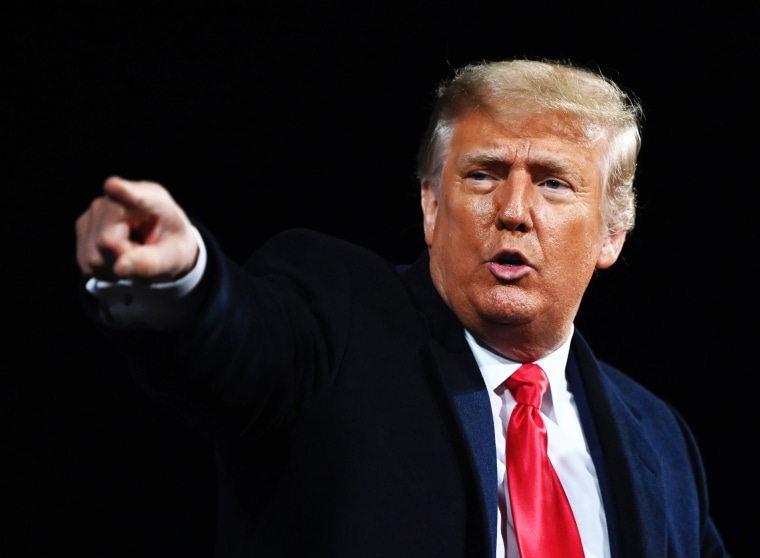President Donald Trump's phone call Saturday urging Georgia Secretary of State Brad Raffensperger to overturn the state's election results might have violated federal and state election laws, but it would be difficult to prosecute, legal experts said Monday.
The potential violation of federal election law centers on a provision that says it is a crime for a person "who in any election for federal office knowingly and willfully deprives, defrauds or attempts to deprive or defraud the residents of a state of a fair and impartially conducted election process."
Trump's conversation with Raffensperger prompted a pair of House Democrats to send a letter Monday urging FBI Director Christopher Wray to open a criminal investigation, saying they "believe the president engaged in solicitation of, or conspiracy to commit, a number of election crimes."
And Democratic legislators in Georgia, meanwhile, are urging the state attorney general and Fulton County's district attorney to open inquiries, as well.
But while some former prosecutors said that they believed the call should be investigated and that it is prosecutable, Matthew Sanderson, an election lawyer in Washington, D.C., said the criminal intent requirements would make a case difficult to prosecute.
"Another 'perfect phone call' from President Trump. We started 2020 talking about a phone call, and now we're beginning 2021 the same way," said Sanderson, a Republican, referring to the call Trump had with Ukraine's president in 2019, which led to his impeachment.
Prosecutors, however, "would need to demonstrate he knows he lost the election," Sanderson said, adding, "I think that's a tough case to bring against an individual who seems pathologically unable to recognize his own loss."
The criminal statutes are meant to address things like shredding ballots and making payoffs, not conversations a candidate has with election officials, Sanderson said. An unsuccessful prosecution, meanwhile, could be some "vindication for the president," he said.
Trump "committed an act against the public trust" that was "egregious," but "it doesn't fit the structure" of the criminal laws, Sanderson said.
While the state statute "offers prosecutors a little more flexibility," he said, "I highly doubt this has legs on that front."
Guidance from the Justice Department's Office of Legal Counsel offered Trump sweeping protections while in office, including shielding him from allegations that he obstructed the special counsel's investigation into Russian interference in the 2016 election. Trump will lose those protections on Jan. 20, but no former president has been indicted on criminal charges after leaving office.
President Richard Nixon likely would have faced criminal charges stemming from the Watergate investigation, but he was pardoned by his successor, Gerald Ford. Trump, meanwhile, is already being investigated by the Manhattan district attorney's office over allegations of financial improprieties from before he took office.
During Trump's phone call, a full recording of which was obtained by NBC News, Trump asked Raffensperger "to find" enough votes to erase President-elect Joe Biden's margin of victory in the state.
"So look. All I want to do is this. I just want to find 11,780 votes, which is one more than we have," Trump said in the call, which was first reported by The Washington Post. "Because we won the state."
Fulton County District Attorney Fani Willis said in a statement Monday that the call was "disturbing," and she left the door open to an investigation.
"It is my understanding from news reports that a member of the State Election Board has requested that the Secretary's elections division investigate the call, after which the board can refer the case to my office and the state attorney general," Willis said, adding: "Anyone who commits a felony violation of Georgia law in my jurisdiction will be held accountable. Once the investigation is complete, this matter, like all matters, will be handled by our office based on the facts and the law."
Download the NBC News app for breaking news and politics
Other legal experts said they thought an investigation and prosecution could move forward.
"There's a lot of possible crimes," former prosecutor Joyce Vance said on MSNBC's "Morning Joe," adding that to her, a criminal case based on Georgia law "looks like a slam dunk."
Vance acknowledged that "these crimes all come down to the president's state of mind."
"Did he really believe he'd won the election and he was just seeking a fair count, or did he know what was really going on here?" she said.
But she added: "There's also this concept in the law of willful blindness, of someone who ignores the truth. So when the president repeatedly asks on this call for the specific number of votes he needs to win, [saying] I just need you to find me 11,780 votes, that's an indication that he's not seeking an election recount, that he's trying to steal an election.
"We need to have an investigation conducted by career officials at the Justice Department who know how to do this right," Vance said.
Former acting U.S. Solicitor General Neal Katyal echoed her.
"I think a criminal investigation here is absolutely warranted," Katyal told MSNBC.
The entirety of the call shows that Trump doesn't really believe there was fraud, because he pressured Raffensperger to "find" a certain number of votes, he said.
"Someone who's committed to seeking the truth goes and wants to seek the truth," he said. "They don't seek a certain specific number of votes and threaten Georgia officials with criminal prosecution if they don't comply."

